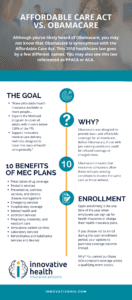The Affordable Care Act, also known as Obamacare, was one of the biggest healthcare overhauls in recent history. It aimed to provide affordable health insurance coverage for all Americans. After several failed attempts to repeal the act, it seems that ACA is here to stay.
In this blog post, we will take a closer look at what this means for American taxpayers and businesses.
What Is the Affordable Care Act (ACA)?
The Affordable Care Act was passed in 2010 and since then it has been under constant threat of repeal. The law required all Americans to have health insurance coverage or face a tax penalty. It also expanded Medicaid coverage and provided subsidies to help people afford private health insurance plans.
In 2017, Republican lawmakers attempted to repeal the Affordable Care Act but were unsuccessful. This led to a lot of uncertainty about the future of the law. However, it now seems that ACA is here to stay, at least for the time being.
What Does this Mean for American Taxpayers?
For starters, it means that the tax credits and subsidies that help people afford their health insurance coverage are still in place. It also means that the Medicaid expansion, which has provided coverage for millions of low-income Americans, is still in effect.
Taxpayers will continue to be responsible for funding the ACA. This includes the subsidies that help people pay for health insurance and the Medicaid expansion. The good news is that, because the ACA is no longer being repealed, there will be no need for major changes to the tax code.
What Does this Mean for Businesses?
The Affordable Care Act requires businesses with 50 or more employees to provide health insurance coverage for their workers. This requirement is still in place, so businesses will need to continue to comply with it.
There may be some changes to the way this is done in the future. For example, the government may provide more subsidies to help businesses cover the cost of health insurance.
Overall, the news that ACA is here to stay is good news for American taxpayers and businesses. It provides stability and certainty in an uncertain time.
Final Thoughts
The Affordable Care Act has provided many benefits, including increased access to healthcare, lower costs for prescription drugs, and free preventive care services. These benefits are worth billions of dollars each year and help to improve the lives of millions of Americans.
There is still some uncertainty about the future of the Affordable Care Act, but for now, it seems that the law is here to stay. This is good news for American taxpayers and businesses who have benefited from the law’s many provisions.
If you’re interested in learning more about the ACA, read these articles published by SBMA: the advantages of the ACA and what business owners should know about ACA benefits.

